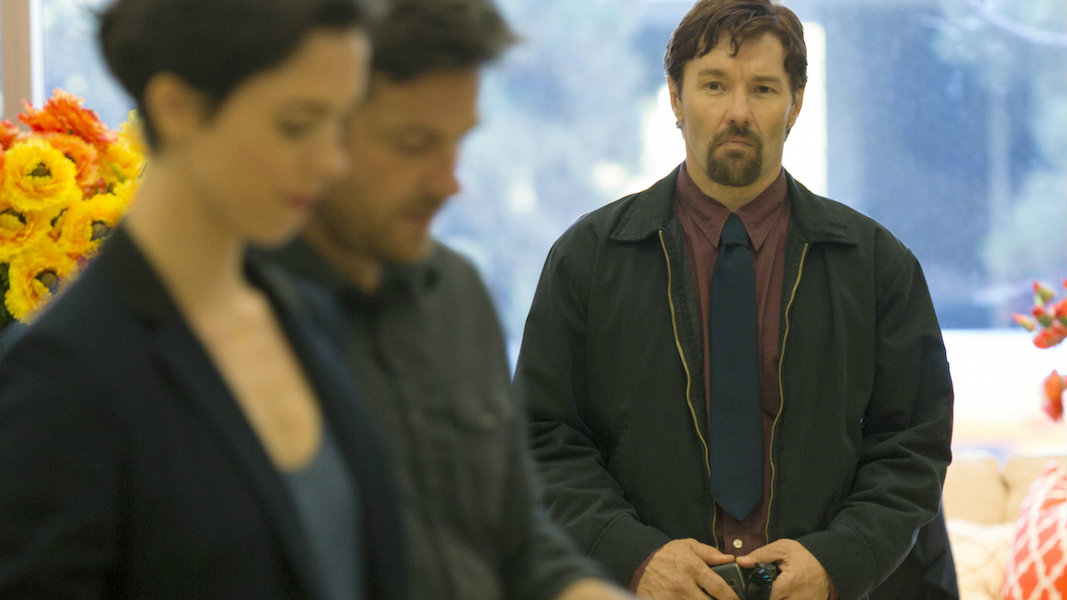 Matt Kennedy / STX Productions
Matt Kennedy / STX Productions“Thriller” shouldn’t be defined as “the level below horror on a scale of frightening-ness.” Thrillers should thrill. There are many ways this can happen—one, it seems, is to tediously feed the viewer scare-lite material for an hour and twenty minutes, and then fling wide the flood gates of terror. You get the thrill, but you have to wait for it.
Joel Edgerton’s directorial debut feature, The Gift, follows married couple Simon (Jason Bateman) and Robyn (Rebecca Hall) as an old friend from Simon’s past, Gordo (Edgerton), begins to show up unexpectedly and often, leaving multiple gifts for his new neighbors. The gifts themselves aren’t actually mysterious (wine, a list of nearby services, and so on). But they are abundant, and Simon becomes unnerved.
The Gift’s suspense hinges on whether or not Gordo is as innocuous as he first appears. Even if you skip the trailer (as I did, for surprise-preserving purposes), you’re confronted with the poster at the theater entrance: Gordo is holding a box. The tagline is “Not every gift is welcome.” Okay.
We open on the married couple checking out an empty house, talking about a “new start.” Eerie music is already playing. The terror tenor will not rise above this level for another hour. That’s how long it takes before Robyn starts to catch on. But while this bit seems pretty obvious the first time the couple haplessly lets Gordo stay for dinner, it’s played as if it’s a big reveal.
The first half of the film seems to leave us thinking that Gordo’s presence is a catalyst to make the couple confront the person to whom they’re really married—a button-pusher for all the sub-surface marital strife to burst through. And that would have been neat.
But if that’s what the movie’s trying to be in its first half, it doesn’t work, mostly thanks to a flimsy script. Bateman and Hall feel like stand-ins for a couple who have a real connection. They talk to each other onscreen like they never have any conversations offscreen. Simon, weirdly, declares to people he just met at a cocktail party that they’re “trying to start a family” (that got personal pretty quickly).
And then he makes remarks on Gordo’s gifts: “I hope his next gift is a knife, so we can make sushi out of those fish.” Huh?
 Matt Kennedy / STX Productions
Matt Kennedy / STX ProductionsLet’s pause on the subject of Jason Bateman as Simon, the once high school bully turned corporate cutthroat and violent arguer. This is a bad case of a miscast comedy favorite. Bateman can do funny (Arrested Development, Horrible Bosses), he can do action (Hancock), and he can do avoiding dad-hood (Juno, The Switch). But this is an odd place to put him. Between his uncomfortable script and his role as a as a lying cad, he’s not only hard to like, he’s hard to believe. He throws himself into it, but to take away his comedic timing is to take away some of his greatest appeal. It’s not his just his character who’s unappealing—it’s also his presence in this role.
But Edgerton is well cast, awkward and fumbly with little undercurrents of cunningness at the right moments. In some scenes, he’s just unnerving enough to keep us wondering what his true nature is. This would be great if there were just a bit more doubt as to his villainy—but again, that poster. The music. The history. The audience is not oblivious, especially when there’s not enough shock or violence throughout the whole film to absorb all attention.
 Matt Kennedy / STX Produtions
Matt Kennedy / STX ProdutionsThrillers follow some standard rules: if the haunted couple owns a dog, it must be the first to disappear. When the wife starts fearing the stranger, she must have a frightening dream we initially assume is real. And yet, The Gift doesn’t hit these eerie notes well. They arrive to make us jump, but only after 15 or 20 minutes of banal: painfully uninteresting chats with neighbors, Bateman and Hall trying to achieve chemistry with flat ingredients, and Simon yammering about the weirdness of Gordo to bump up his bully status.
The conclusion will probably stun you, and it’s firmly good and scary. But possibly not worth waiting through everything before it.
Caveat Spectator
This film is rated R. Bateman swears and gestures and makes imitations of genitals with his fingers. Someone breaks into a home and throws punches as cocktail party guests. One character’s past involving molestation and attempted abuse is discussed. A scene implies rape but doesn’t show it. Most moments of peril involve is-there-someone-in-the-house moments.
Taylor Lindsay is a writer living in New York City.












